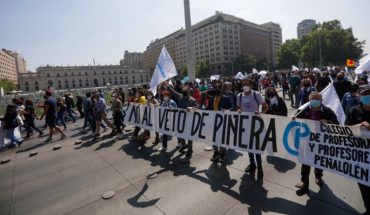In the crucial chapter XV of The Prince, Machiavelli holds a passionate defense of political realism. It is a realism that allows you to understand the options available at a certain time. That ability to guide action according to facts and contingency would generally be acquired by a combination of analysis of the actions of previous political leaders, as well as the innovation proper to every new time.
This would be the result of reflection and experience. It is from them that the need to change judgment, plans and strategies should be understood. For example, independents elected at the defunct Constitutional Convention quickly understood that “loose people, the lone adventurer” do not exist in politics: they quickly tended to articulate themselves in concrete programmatic caucuses. In other words, to build what they used to revil: matches.
We cannot say the same about other actors. The recent statements of President Boric baffled the sectors that, in the plebiscite of September 4, support the Rejection, by putting on the agenda what is appropriate if this option is imposed. Two possible responses have emerged among these sectors: one supports the abandonment of the process and the reaffirmation of the 1980 charter (with further amendments) and another has vaguely suggested the idea of a “commission of experts”.
Both lack lucidity. The first is for dismissing the act of violence that would mean perpetuating a constitution rejected by almost 80% of citizens less than two years ago. The formula to reform it is already worn. The second for not understanding what a constitution means in general (a framework for assigning legitimacy to institutions) and the particular circumstances that led to the current process. That is why it is not a problem of constitutional engineering, but of the ability to produce recognition of the institutions that politically and legally govern citizens. Of course, every constitution implies in its formulation a degree of legal technicality and design of political institutions, but its central virtue is to produce a minimum consensus and therefore a citizen commitment, with respect to the principles that articulate these institutions and life in common.
This is not to mention the enormous political and social uncertainty that would come from the practical problems of implementing such an idea: what is an expert? Only constitutional lawyers? Why not lawyers in general? Or political scientists, sociologists, economists, etc.? Do people without a degree have nothing to contribute other than to approve or reject the proposal? Moreover, who will choose the experts? Congress, government, the judiciary, a council of universities?
But the lack of understanding is not the exclusive property of sectors in favor of the Rejection option. In another crucial chapter, Machiavelli argues that in politics there is nothing more difficult than being responsible for the introduction of a new political order. The reason for this lies, the Florentine tells us, in that such an enterprise will necessarily have as bitter enemies the beneficiaries of the previous order, while it will only have lukewarm defenders among the beneficiaries of the new order, since fear and skepticism of those who must experience before trusting prevail in them.
A good part of the political actors that have promoted the constituent process and approve the draft of the new Constitution seem to have overlooked the aforementioned teaching: they assumed that the percentage of approval of October 2020 would be replicated by a majority in the exit plebiscite. Worse, it seemed that the fact that the right obtained less than a third in the Convention made it possible to write a project that did not have their consent, ignoring the ability of that sector to install the agenda and arouse fears, reasonable or not, of an important part of the citizenry.
One of the great lessons that the constituent process seems to have delivered is that there is no room in our country for a hegemonic constitution, understanding by such a charter that excludes the vision of a significant political or social sector. Although many national and foreign constitutionalists point out that the draft constitution that will be voted on in September is not hegemonic, it is perceived as such, which in political reality is what matters. Either by the arrogance or action of sectors of the extreme left in the Convention, or by theTo the evident majority of the right since the beginning of the constituent process (added to the disposition of a growing extreme right in that sector) the project did not consider a vision that, according to the last election, exceeds 40% of the electorate. There does not seem to be any political or stability space for a constitution that does not incorporate, at least in part, the vision of that sector.
In reality, the path suggested by the President seems to be the right one to travel if the Rejection option is imposed in September, as is clearly feasible. But even in that scenario, that doesn’t mean completely dismissing the current proposal. Any new Constitution must incorporate substantive agreements in at least four areas: political regime; feminism; environment; private property and a majority-accepted legal form of plurinationality. No Constitution will be stable without national agreements or political commitments supported transversally in any of these matters, and such a judgment is a political reality that must be accepted by all actors on the spectrum.
Machiavelli, in the Dedication of the Prince, compares the action of the politician with that of a painter. Edward Hopper, a master of realistic psychological painting, will point out of abstract art: “One of the weaknesses of much of abstract painting is the attempt to substitute the inventions of the human intellect for a private imaginative conception.” Abstract painters have existed on both sides.
Follow us on
The content expressed in this opinion column is the sole responsibility of its author, and does not necessarily reflect the editorial line or position of El Mostrador.





